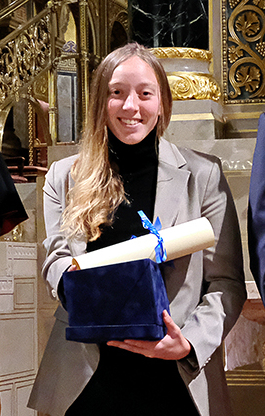
Pál Szekeres is a retired Hungarian foil and sabre fencer. He has the distinction of being the first person to have won medals at both the Olympic and Paralympic Games.

The Union of Soviet Socialist Republics competed for the only time at the Summer Paralympic Games in 1988. The country also competed for the only time at the Winter Paralympic Games that same year.

The United States sent a delegation to compete at the 1988 Summer Paralympics in Seoul, South Korea. Its athletes finished first in the gold and overall medal count.

Ecuador made its Paralympic Games début at the 1976 Summer Paralympics in Toronto, with a small delegation of three competitors in track and field and swimming. The country has participated in every subsequent edition of the Summer Paralympics, except 1980 and 1988, but has never entered the Winter Paralympics. Ecuador's delegations have always been small.

Mexico made its Paralympic Games début at the 1972 Summer Paralympics in Heidelberg, with a delegation of seven athletes competing in track and field, swimming, weightlifting and wheelchair fencing. It has competed in every edition of the Summer Paralympics since then, and made its Winter Paralympics début in 2006.

Puerto Rico made its Paralympic Games début at the 1988 Summer Paralympics in Seoul, with a delegation of twelve competitors in archery, athletics, shooting and table tennis. It has participated in every subsequent edition of the Summer Paralympics. The country is set to first compete at the Winter Paralympics in 2022.

Oman made its Paralympic Games début at the 1988 Summer Paralympics in Seoul, with competitors taking part in track and field, table tennis, weightlifting and wheelchair fencing. The country has participated in every subsequent edition of the Summer Paralympics, but has never entered the Winter Paralympics. Oman's largest delegation was in 1988 with seven athletes. Only male athletes competed until 2016 when Raya Al’Abri competed in women's javelin. Oman won its first medal at the 2020 Summer Paralympics when Mohammed al-Mashaykhi won bronze in the Men's shot put F32.

Cyprus made its Paralympic Games début at the 1988 Summer Paralympics in Seoul, with a delegation of six athletes competing in archery, track and field, and swimming. The country has taken part in every subsequent edition of the Summer Paralympics, but has never participated in the Winter Paralympics.

Hungary made its Paralympic Games début at the 1972 Summer Paralympics in Heidelberg, with a delegation of four athletes in track and field. Following another appearance in 1976 the country was then absent in 1980. The Hungarian delegation made a permanent return to the Summer Paralympics in 1984. Hungary first took part in the Winter Paralympics in 2002, and continuously attended the Winter Games through 2010. Hungary was absent from the 2014 Winter Games.

Czechoslovakia made its Paralympic Games début at the 1972 Summer Paralympics in Heidelberg, where it was one of just four Eastern Bloc nations competing. Czechoslovakia sent a delegation of nineteen athletes, who all competed in track and field, and won a single bronze medal in the shot put.
Éva Csernoviczki is a Hungarian judoka. She became the first Hungarian woman to win an Olympic medal in judo, after getting the bronze in the Woman's Judo 48 kg in the 2012 Summer Olympics. She also competed in the women's 48 kg event at the 2016 Summer Olympics, where she was eliminated by Galbadrakh Otgontsetseg in the repechage.

Mexico sent a delegation to compete at the 1988 Summer Paralympics in Seoul, South Korea. Its athletes finished twenty-fourth in the overall medal count.

Netherlands competed at the 1988 Summer Paralympics in Seoul, South Korea. The team included 110 athletes, 76 men and 34 women. Competitors from Netherlands won 83 medals, including 30 gold, 24 silver and 29 bronze to finish 8th in the medal table.

Hungary competed at the 1992 Summer Paralympics in Barcelona, Spain. 43 competitors from Hungary won 11 medals, including 4 gold, 3 silver and 4 bronze and finished 25th in the medal table.

Malaysia competed at the 1988 Summer Paralympics in Seoul, South Korea from 15 October to 24 October. The country qualified 14 competitors and finished 48th at the medal table after achieving its first Paralympic medal ever as well as its first Paralympic medal in weightlifting which was contributed by Mariappan Perumal who managed to clinch a bronze medal in the men's 57kg weightlifting event.

Indonesia competed at the 1988 Summer Paralympics in Seoul, South Korea. Indonesia won 2 medals, both silver, finishing 43rd in the medal table.

West Germany competed at the 1988 Summer Paralympics in Seoul, South Korea. 188 competitors from West Germany won 193 medals including 76 gold, 65 silver and 52 bronze and finished 2nd in the medal table.

Hungary competed at the 1984 Summer Paralympics in Stoke Mandeville, Great Britain and New York City, United States. 26 competitors from Hungary won 29 medals including 13 gold, 11 silver and 5 bronze and finished 18th in the medal table.

Hungary competed at the 1976 Summer Paralympics in Toronto. Its athletes finished thirtieth in the overall medal count.

Zsófia Konkoly is a Hungarian Paralympic swimmer.















